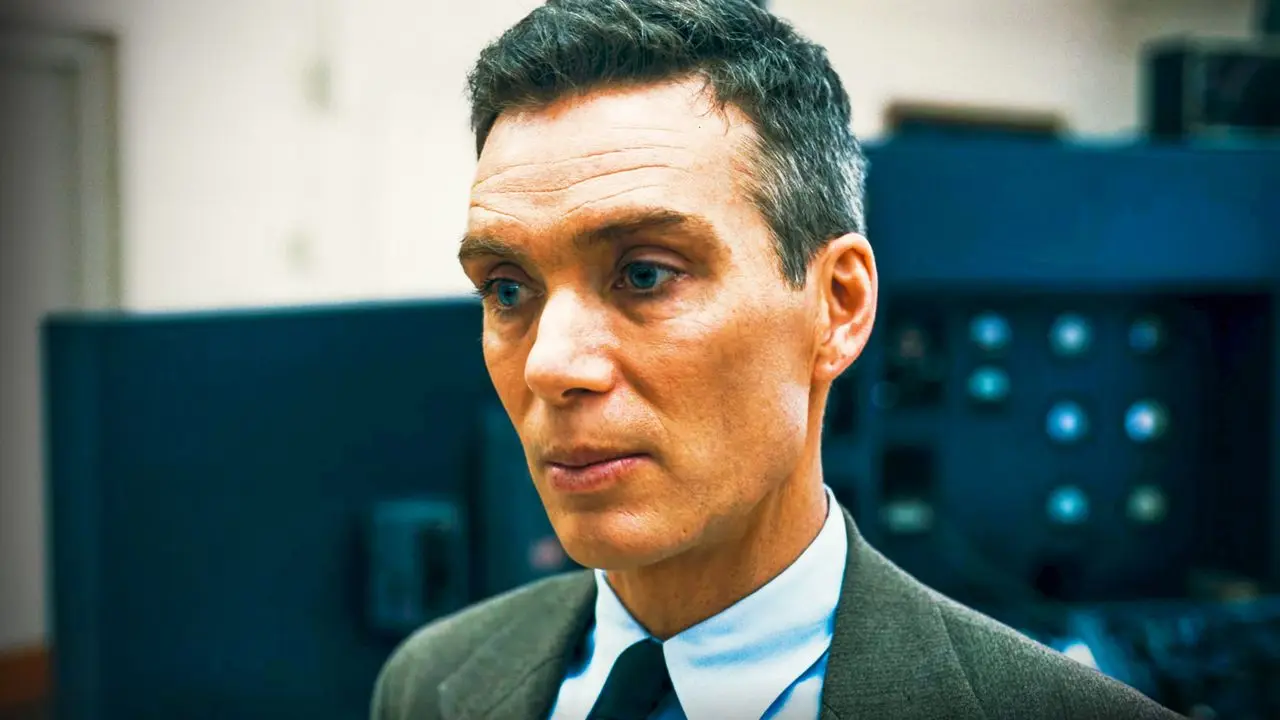
I’ve often called Christopher Nolan the thinking man’s Michael Bay, and I know I’m not the only one to share this perspective. He makes big films where things blow up really nicely without feeling like your brain cells get caught in the blasts. With Oppenheimer, he tackles the biggest explosion and surrounds it with a searing drama of science, politics, and existential dread. What follows is a film that finds more ways than one to make the story of J. Robert Oppenheimer a thrilling experience.
This three-hour picture is engaging because it hits the ground running and rarely slows down. Cillian Murphy plays Oppenheimer in a nonlinear tale of how he went from a rising talent in science universities to the father of the atomic bomb. In addition to jumping around various points in time, the first act comes with brief glimpses of his mind, formulating the nature of atoms and how they might split.
The film goes through the details of his life, making brisk stops around his romantic affairs and interests in communism. The speed comes not just in the editing but in the dialogue pacing as well. Before you’ve had time to digest how Oppenheimer formed the foundation of theories on atoms, we’re whisked further down the timeline to him being grilled on past political interests. As the color shifts to black-and-white when highlighting the political attacks of Lewis Strauss (Robert Downey Jr.), it’s back to the university where Oppenheimer is fancying engaging Jean Tatlock (Florence Pugh) for their shared interest.
Once Lt. General Leslie Groves (Matt Damon) comes knocking, everything starts to change. Oppenheimer becomes so laser-focused on his science that he’ll find any means to continue and not question the ethics of building a bomb. The drive continues while the worries and guilt bubble in the back of his brain, where there’s a constant stay-the-course notion for all his efforts. Every controversial choice is rationalized in the faintest ways, where so much of Opp’s sins are smoothed over with logic. All the logic crumbles into ash when he realizes the full weight of what he’s unleashed.
Nolan’s direction is masterful at painting of pathos for the historical figure. Even when displaying the scientist’s drive, the film never loses sight of the following horrors. There’s scorn the way Jean peers into Oppenheimer’s soul amid their sexual affair and dwindling faith in politics. There’s judgment in the way that his wife Kitty (Emily Blunt) doesn’t give the man a break for his pathetic rationales. While others may overlook his indiscretions, the man soon has to hold himself accountable when it feels like nobody else will, whether they find favor with him or not.
This leads to a plethora of fantastic performances. Niels Bohr (Kenneth Branagh) offers insight but is distant from the project, having more foresight after witnessing the terrors of war. Albert Einstein (Tom Conti) won’t let genius slide as the fear of nuclear annihilation becomes closer. President Harry Truman (Gary Oldman) offers only a mocking gesture when Opp confesses their disgust of the death he brought about. And there are too many unique voices present to properly count them all, spanning from Josh Hartnett to Alden Ehrenreich to Jack Quaid to Rami Malek.
Oppenheimer doesn’t give an easy or slow story for the complicated father of the atomic bomb and fully loads it with the pathos it deserves. It is not a celebration of the figure but a trial of his overlooked sins, making this film more of a courtroom drama than anything else. True to Nolan’s filmmaking, there is a giant explosion, but it carries more than spectacle. The delay in sound carrying for the event forces the viewer to look closer at what atrocities were unearthed with this denotation. The reasoning for avoiding a ground war, being the first developer, and avoiding Japan’s “good areas” did not justify the bombings. There is blood on Oppenheimer’s hands, and this powerful film refuses to give his breakthrough a pass. It is a film of profound guilt and may be the best film that Nolan’s ever made for being so blunt, condemning, and exceptionally staged.

 “Deadpool & Wolverine” Review
“Deadpool & Wolverine” Review  “The Boys: Season Four” Review
“The Boys: Season Four” Review  “The American Society of Magical Negroes” Review
“The American Society of Magical Negroes” Review  “Twisters” Review
“Twisters” Review  “Sausage Party: Foodtopia” Review
“Sausage Party: Foodtopia” Review  “Robot Dreams” Review
“Robot Dreams” Review  “Godzilla x Kong: The New Empire” Review
“Godzilla x Kong: The New Empire” Review  “Slave Play. Not a Movie. A Play.” Review
“Slave Play. Not a Movie. A Play.” Review 


